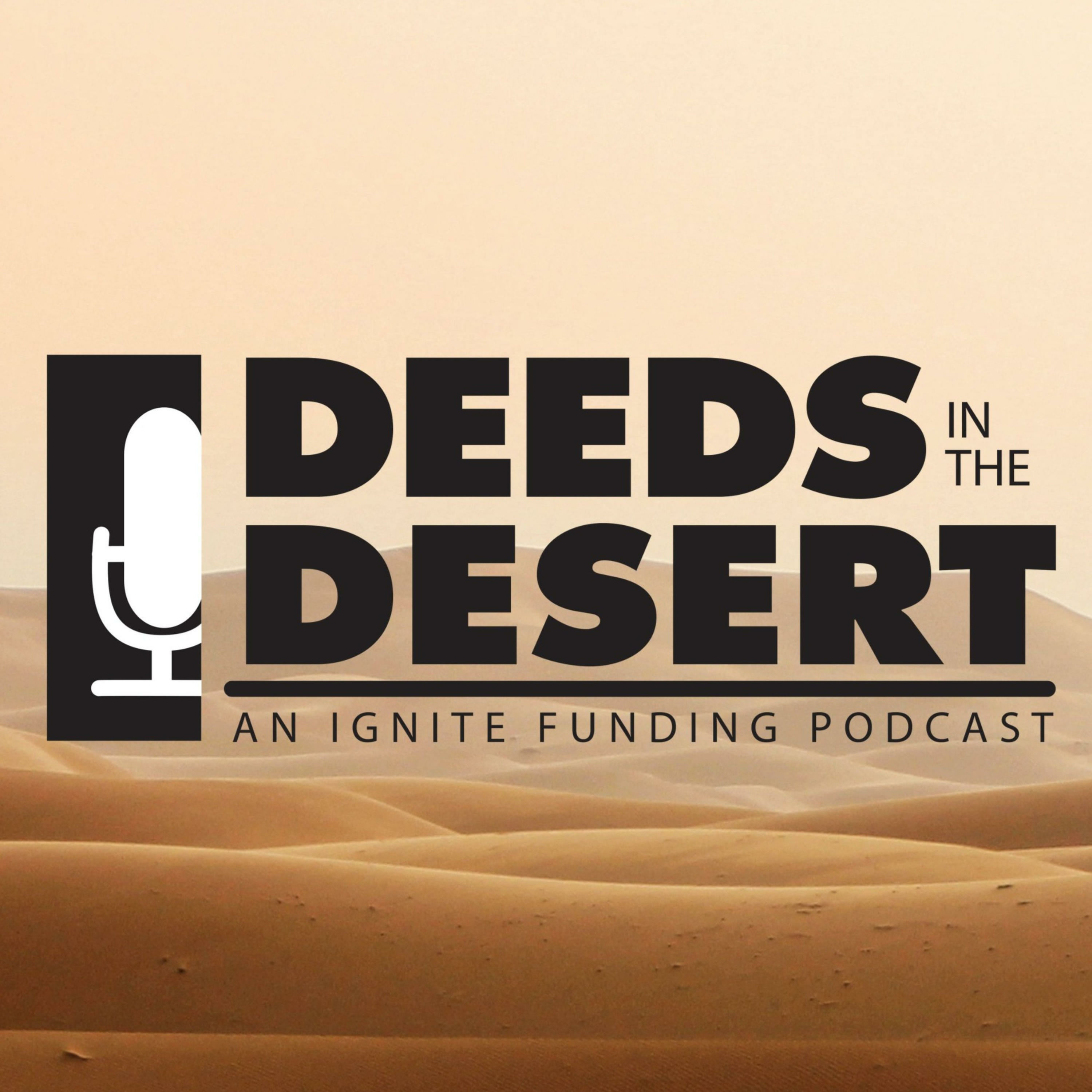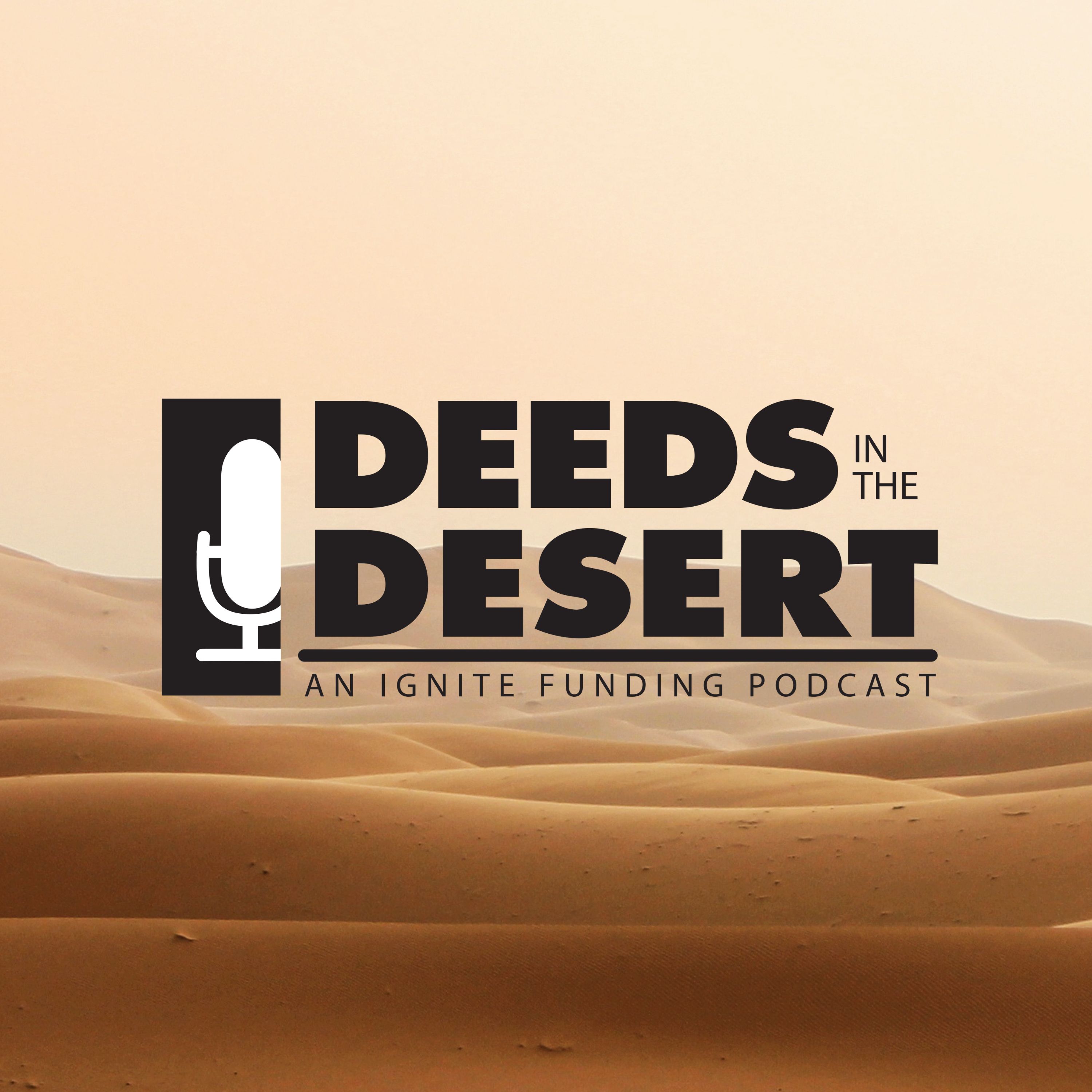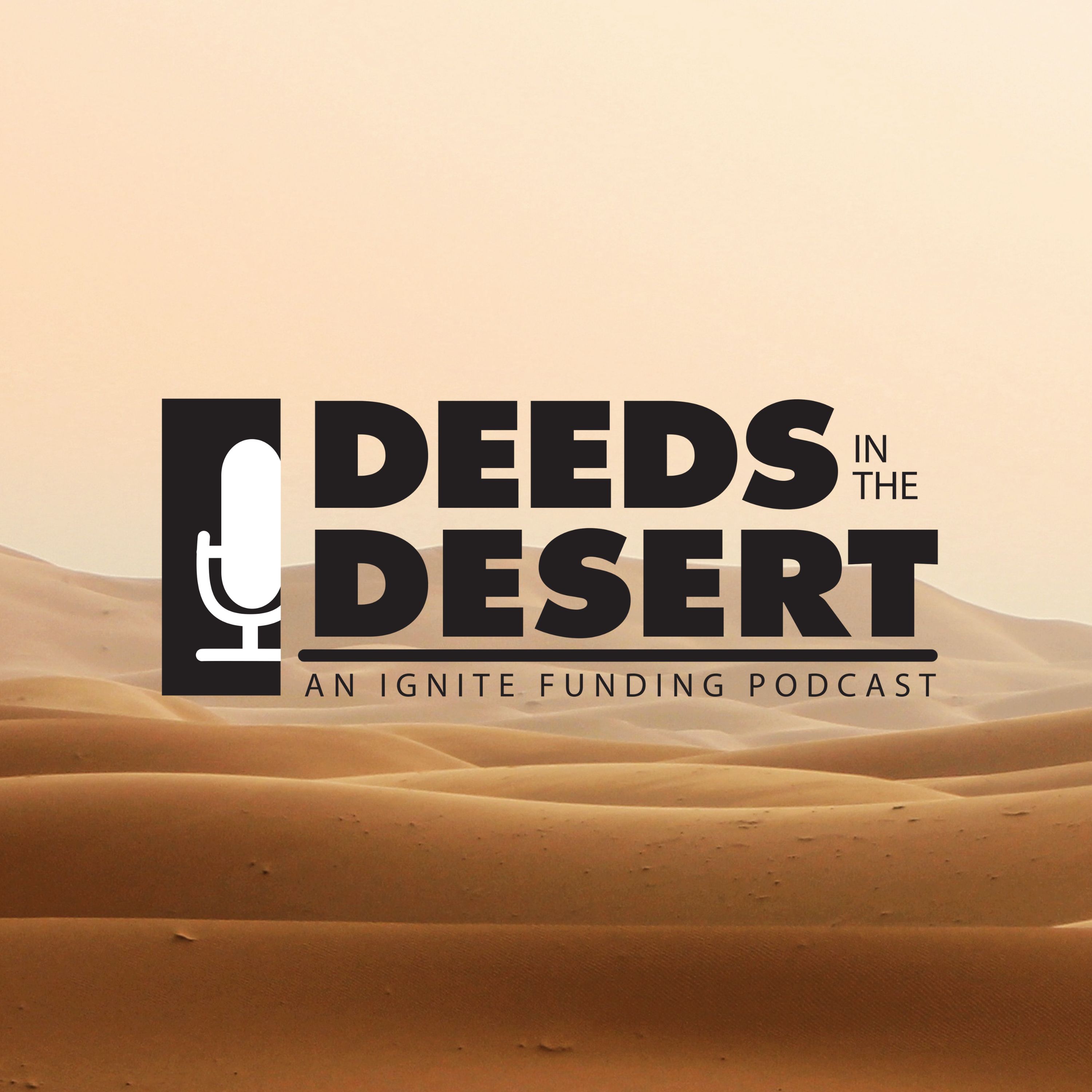[00:00:00] Speaker A: Welcome, listeners, welcome, listeners. You're listening to the deeds in the desert, the place where real estate investors tune in for the latest news and available investments at Ignite funding. If you're on the hunt for a low effort passive income stream, then turn up that volume and pull out the hammock. As we get ready to feed you your weekly dose of real estate investing insights.
[00:00:29] Speaker B: Welcome to deeds in the desert, first episode of 2024. Myself, my name is Izzy. I oversee the marketing department here at Ignite funding. Got my guest today, Pat Vassar, who, you've heard his voice, probably never seen him. Now you can see us. That's the biggest change we have for 2024 here on deeds in the desert. So let's just jump right into it. Pat, I got some notes here. Let's start off with a recap on the borrowers. So what was the biggest change as far as 2022 to 2023 and the growth?
[00:00:57] Speaker C: Well, the biggest change for us was we added six new borrowers. Previously we had 27 borrowers borrowing from us. Now we're up to 33. So an additional six people. Those additional six people come, majority from the residential side of things. They are no longer just on the commercial side. We're kind of moving away, not moving away. We're changing up a little bit of how much concentration we have within the commercial side, getting a little bit more into the residential. So those six new developers, a majority of them are in that residential. Side effects.
[00:01:32] Speaker B: When you're thinking of bringing in new borrowers, what's the main factor of why you're bringing them? I know we're obviously trying to grow as a company, so that's a given. But what drives you into bringing those?
[00:01:42] Speaker C: Great question. The number one aspect is the location. First, I want to figure out where the migration is moving towards where people are moving, because at the end of the day, a rising tide raids all boats. And so we want to make sure we're in a market in which has good economic drivers. One is supply of new construction, and then the demand, the demand side comes from people moving into that area. So we want to make sure that is still strong and robust. Once we find a market that we really like, then we'll start going and looking for more borrowers or a borrower in a new site. Once we kind of hone in on the borrower, we'll start getting to know them. That courting phase usually takes six months to two years. It really just depends on how quickly they're able to move and how solidified their relationships are in the banking industry already.
[00:02:35] Speaker B: Well, since you talked a little bit about location, based on my cheat sheet over here, looks like we reduced down what we had in Las Vegas from 22 to 23. And what I mean by that is the loans that we were servicing and funding in that area, and looks like we made a pretty big shift over to Utah. Can you tell me, is that similar to what you were saying right now, why we shifted in that?
[00:02:53] Speaker C: That's part of the reason, yes, we did drop down here in Las Vegas, not because we are not looking forward to the robust growth to continue here in Las Vegas, but because we want to get outside of our box a little bit. We're a little too concentrated in Las Vegas, so we moved into another market that has fairly good drivers associated with it, which is Utah.
[00:03:19] Speaker B: Yeah. I think people have a misconception. They feel like when you're pulling out of an area, it's for a reason. It's not necessarily for us. It's diversifying a little bit more. We're moving with the markets, like you said, I think that's a big thing for us. But, yeah, it's a significant amount. I mean, based on what you had from last year, from 22 to 23, it's about $40 million more out in Utah.
[00:03:38] Speaker C: Absolutely. And there's a few more borrowers that we got from Utah as well. So that skews the numbers a little bit. If you just look at our existing borrowers, not taking into account the new ones we received, it wouldn't be as dramatic of a shift from 2022 into 2023. And these are numbers that are at the end of the year. So end of year 2022. End of year 2023. So we're kind of comparing apples to apples there.
[00:04:05] Speaker B: So another shift I had noticed is because we all go in different phases. Obviously, for those that don't know, we go through acquisition, we go through development, and then we go through construction. In 22, acquisition was roughly about 60% of what we were funding at the time. And if you keep up with what we're doing in the phases, then you just go on to the next one. So that's why you see acquisition dramatically down for 23 compared to 22. What's the largest one that we did in 23?
[00:04:32] Speaker C: By far the largest was construction side of things.
That kind of happens from two components. One is that's just the natural lifecycle that you were referring to, the acquisition phase into the development and ultimately into the construction phase. Another big component to that is the silicon bank failure that happened earlier in 2023. When that happened a lot of banks pulled back for two reasons. One of what happened there, and secondly, because of their misallocation of maturities, they had a lot of short term deposits and longer term notes. Those longer term notes, the value of them were getting decreased because as interest rates went up, the value of those bonds went down. So the lending really stifled and almost became nonexistent for quite a long period of time. So that's where we stepped in. If you look at it. Historically speaking at least, construction loans are mostly viewed as the lowest risk on the entire risk spectrum. So the more we can move into those at any point in time, typically the better. So we're just kind of taking advantage of what the market offered, really. We are not a one size fits all approach. We are very dynamic and nimble enough to move where the market does. Wherever there's inefficiencies or opportunities, that's where we'll get involved. That's why we move in and out of markets. That's why we move in and out with borrowers. That is why we move in and out with different asset classes and locations all across the United States.
[00:06:07] Speaker B: Is the banking issues that you brought up earlier affect? One of the things that I see here on the sheet, which is forbearances, because forbearances went up, almost doubled from what we had the year for the previous year.
[00:06:19] Speaker C: Yeah, forbearances have gone up.
Although some investors may think of forbearance as a four letter word, kind of a naughty word, all of those forbearances are continuing to pay interest. All of them are still in their loan specifications minus the maturity date. That is the only thing that has really changed on any of those loans. So most investors who are using these investments into qualified accounts or self directed IRA accounts don't really know a difference. As a matter of fact, only thing that really changes is less paperwork for them and no downtime. They didn't get paid off on something, have to wait to reinvest into another loan. They are invested the entire time, which is usually a benefit for those qualified accounts, for cash accounts that you've already allocated that money to be spent elsewhere, that is where it becomes kind of an issue. It has increased over the past year into 2023, but I do anticipate that to decrease into 2024.
[00:07:22] Speaker B: So what are the main reasons why we do a forbearance?
[00:07:25] Speaker C: The main reason is really kind of twofold. One is if the borrower just needs a little bit more time, it doesn't really make sense to refinance into a whole new loan. We'll ask the investors to do a short term forbearance. The other point is if the loan, for whatever reason, we don't feel comfortable originating a new loan, whether it's a market that we're trying to get out of, a borrower we're no longer doing business with, or a property's valuation that has kind of gotten out of whack where we underwrote the deal. If things have changed and made it not as juicy of a loan to value, then we will not refinance it.
[00:08:01] Speaker B: This all sounds great. I want to piggyback off of that now and actually plug in some marketing information into that. We attend a ton of events. That's how we get to meet potential investors and meet some of our current investors. And it's a really cool way for us to really go face to face with some of the clients so that they can see who we are, what we're about, and actually give them the detailed information. We almost pulled in 200 new investors just from the event side of things. It's awesome time for 2023 as far as events go. We just try to get the word out there and I think that's what we did a really good job in 2023. Added over 500 new investors for this, which is, I think, indicative of why you're having to add more borrowers, add more new loans for the investors to jump onto. Over 200 very satisfied clients decided to write a review about ignite funding on Google, on Facebook, on the Better Business Bureau that helps us in long term. Let's jump into 2024. Pat, what are you excited about in 2024 for underwriting?
[00:08:59] Speaker C: Well, as we transition, you kind of alluded to it. We have to add more borrowers, more markets, more product type as we continue to grow. Last year we saw our servicing number, which is the number that we have under management at any given time, increase by $60 million. I do expect that number to increase even more than that in 2024. And doing so, we will continue to move with the market. Right now, one of those big drivers is we'll be moving a little bit more into the residential side, away from the commercial. We will continue to move into Arizona, which will be a big market for us, even more so than it already is. It probably will be our second largest market by the end of 2024.
[00:09:44] Speaker B: That's significant because you have it down here as the fourth. So, yeah, jumping two big spots.
[00:09:49] Speaker C: There's still some great drivers down there. We'll be moving away from build to rent product. So long as it is on the acquisition side, I think that's a little overdone. At the time being, or for the time being, we'll continue to move into low end and high end residential in primary and secondary markets. We'll stay away from tertiary markets.
[00:10:12] Speaker B: What do you mean by that? Secondary and tertiary, secondary and tertiary markets.
[00:10:16] Speaker C: You have the MSA metropolitan statistical areas, areas in which the bureau labor statistics calculate to be one geographical location. For example, we're here in Las Vegas, but it doesn't just include Las Vegas. It includes kind of the outlying areas as well. Henderson, Summerlin and whatnot. To make it all one geographical area, primary markets are the ones you think of all the big metropolitan areas. Secondary markets are smaller in size and tertiary markets are even smaller than that. We are trying to stay away from those really small areas and make sure we're primarily focused on the primary and secondary markets goal.
[00:10:57] Speaker B: I know you kind of talked about it servicing. Where are you ultimately trying to get by the end of 2024?
[00:11:02] Speaker C: So we're at 340,000,000 at the end of 2022. We're at 400 million at the end of 2023. My goal is to be at 510,000,000 at the end of 2024. So an extra massive million dollars over the next twelve months.
[00:11:18] Speaker B: Yeah, that's tons of growth. So I think we have some lofty goals up there. But if we hit them, it's going to be good for everybody across the board.
[00:11:25] Speaker C: For the borrowers, the investors, and us here at ignite funding, that's what we like to call win win, and that's what we're all about.
[00:11:31] Speaker B: Well, I guess that's going to go ahead and wrap up today's episode of Deeds in the desert. Thanks, Pat, for joining us today on the recap for 2023. It's been great.
[00:11:38] Speaker C: If there's anything specific you want to dive into, let me know, because I'm sure it's not just you. There's many others that are wanting the same content.
[00:11:45] Speaker B: Exactly. Well, thanks again for joining us on today's episode, the first episode of 2024 on Deeds in the desert. We'll catch you guys on the next one. Farewell.
[00:11:55] Speaker A: Thanks for joining us this week on Deeds in the desert, where short term investments meet long term investors. We hope you enjoyed the content so much that you share it with all your friends. Who doesn't like learning about passive fixed income, right? Still hungry for more education? Visit our
[email protected], or if you're ready to take the leap and start investing give us a call at 702-7610 and schedule a free investor consultation.


